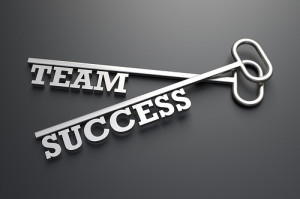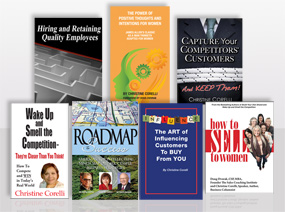
(This Article was published by Packaging Horizons Magazine – Reprinted With Permission)
Keep your professional skills and business tools at the cutting edge. Anyone who has watched a talented craftsperson at work knows that the tools are just as important as the materials and the knowledge that go into creating the finished piece.
It might be difficult to equate someone carefully carving wood to today’s businessperson cutting an elegant deal over a cell phone, but the principles are the same. Having the right business tools to do the job and keeping them sharp have the same results for the carpenter as they do for the business professional. The only difference is what kinds of tools they’re using.
Soft skills give you a hard edge advantage Instead of talking about chisels, Christine Corelli who is a consultant, international business speaker, columnist, and author, cites communication skills as one of the most important business tools that professionals use. “Studies reveal that 85 percent of your career success is in direct proportion to your ability to communicate,” she says. “In the business world specifically, you need to be able to influence people – whether your goal is to increase sales, improve management and employee relationships, implement change, build customer relations, create a winning team or convey the value of your product to customers.” Molly D. Shepard, founder and principal of The Leader’s Edge, a Philadelphia-based consultancy, also cites the skill to be able to communicate your ideas persuasively, whether one-on-one or in a group, as a business skill that should always be handy. With the advent of the Internet and e-mail, being able to communicate effectively is even that much more critical.
Pulling out more of the soft skill set of tools, Shepard brings up the capability to be a team player as the workplace becomes more and more team oriented. Corelli talks about being a team player in the realm of being accountable to take responsibility for what needs to be done. Team players are supportive of others and display initiative beyond the confines of the job description. She compares this kind of attitude to “entrepreneurial thinking,” which means if you use this tool well, you think and act as if the company were your own. “You understand that you must not only answer to management for your performance, but feel that you are accountable to your colleagues,” she explains. Flexibility is another tool that Corelli thinks is critical, especially in light of present economic conditions. “If you are not adaptable to change, it may seriously impede your ability to advance your career,” she advises. Those who have the tool of flexibility will not only survive, but also be able to learn from change.
Along with flexibility, Samantha Goetz, advertising, marketing and communications manager at ORBIS in Oconomowoc, Wisconsin, puts creativity, which in essence is the ability to see outside the “We’ve always done it this way” box. To Goetz this means being open to new things whether it’s working on a program or initiative, communicating with customers or within the company.
Knowledge powers up your business tools…
She goes on to add a good knowledge of the key industries in which you do business to this list of tools. What are the business conditions that affect your customer or your company? What do you know about the factors such as seasonality, climate, the availability of the labor pool and raw materials, pricing, and the competition that affect your company? “Whether your target audience is a traditional customer, employee group or community group, you need to know about them,” she says, advising to read industry trade publications as well as continuing your education.
Along with business conditions, the tool of understanding current economic conditions should be added to your skill set. According to Shepard, the ability to read and understand the language of the financial world is important. This tool is easy to pick up by reading the Wall Street Journal, Forbes and the business section of your daily newspaper.
To Linda M. Barron at L. Barron & Associates, Inc. in Cooper City, Florida, professionalism is a tool that covers a lot of territory but needs to be included. By professionalism, she means the ability to stay organized, to roll with the punches and take both criticism and praise gracefully, the respect for other people’s time, and persistence and dependability.
Technical skills complete the set…
While the soft skills seem to be what business professionals reach for today, that doesn’t mean that technical proficiency and knowledge of the industry are left out of this tool chest. In order to move up in the organization, you must have the basic technical skills that match the needs of the organization. This includes computer proficiency and versatility with the Internet. In addition, Shepard points out that a graduate degree, such as an MBA or other advanced degree, is an important tool to have because higher degrees are equivalent to the bachelor’s degree of 20 years ago.
The business tools that get handed to you…
Up to now we’ve discussed the business tools you get from within yourself, but according to Shepard and Goetz, having a professional network of colleagues in and outside your organization is invaluable. Shepard advises that your professional network should be filled with people who can give you thoughtful, rich information when you need it. To Goetz, a good network will allow you to brainstorm ideas, evaluate new technologies and review business decisions before putting them into action. Trade associations are a great way to meet people in your industry and add them to your network. Shepard adds mentors to this list of business tools – someone who can give you ongoing advice from an objective perspective about how best to craft your career.
Where to find the business tools you don’t have. . .
Those who use woodworking tools have only to go to a hardware store to pick up what they need. For business professionals, the right tools are not so easy to come by. The consensus is that it’s basically the responsibility of the individual to acquire the needed skills to succeed in business. “Just like no one can make you successful, neither can anyone just hand you improved skills. You have to want to learn them and work toward improving yourself,” says Barron. Corelli points out that companies today are extremely budget conscious and subsequently training programs seem to be the first to go. However, those companies that are committed to continuous learning and pay for it will be the ultimate winners. But she agrees that individually, we must take ownership for our own personal and professional development.
Goetz sees training as a partnership between employee and employer. The employee must be proactive and take advantage of every training opportunity provided by the employer. It is the organization’s responsibility to provide tools to stretch each employee’s skills. Your boss, in Shepard’s opinion, is a benchmark. “Hone your skills against the skill sets of your boss and look around you to determine where new skills might be most important,” she says. By understanding what are the key factors of success in your company and getting the training to assimilate those qualities, you’ll be on the same page.
How to know when you need a good sharpening . . .
Not only are dull tools unsafe, they don’t do a very good job. Same with business tools, however not every professional knows when his or her tools need sharpening, metaphorically speaking. Shepard cites two red flags that tell you it’s time to pull out the grinding wheel. “The first is being passed over for a raise or promotion,” she advises. “The second is being kept outside the loop-for instance, you may find that you no longer are being asked to important meetings.” For Goetz, it’s the customer who is not responding to your efforts, or the trouble you might have relating or understanding your target audience’s requests that signal you need to regroup. Perhaps your projects need multiple reworking or you are losing sales orders. Barron agrees that this is a sure-fire sign that something is wrong with your set of business tools. “If I lose a customer completely, I know a major sharpening and reassessment of my actions is called for,” she states. She asks the question, “Are you gaining ground or losing ground as each day passes by?”
Looking over the set of tools Shepard keeps, she concludes that maintaining your business tools is a critical success factor – one that requires your constant vigilance to keep them sharp and make sure they are the right tools for the job and for the organization.
What is Your Most Valuable Business Tool? Have you ever been caught in a situation without the right tool? Sure, your shoe works for pounding in a nail if you absolutely have to. But if you think of all the tools in your tool chest or in a kitchen drawer, probably one comes to mind that you would not want to be without.
Christine Corelli – When I asked the human resources manager of a Fortune 100 corporation, “What, in your opinion, is the most important skill a business professional needs to achieve success in their job role?” he responded, “Easy. People skills.” I agree. A book entitled “The Luck Factor” by Max Gunther reinforces this. He studied successful people from all walks of life to determine whether “luck” really played a strong role in their success. His book revealed that the most successful people achieved their status because they are well-liked, because they are warm, sincere, positive and because they make others feel good about themselves.
Linda M. Barron – I consider my most valuable tool to be my organizational skills combined with my computer skills. These skills give me a major advantage over most of my competitors. Using these skills I am aware of what is happening in my industry, able to determine what benefits my company, what offers my company an opportunity, or what actions or changes could cause a future problem for my business.
Samantha Goetz – My most valuable tool is the professional network of colleagues that I turn to again and again. They can offer dynamic insight and a new perspective on any given project. I maintain this tool by growing the relationships with these people, through organizational activities, team projects and social activities. Maintaining a solid value system and integrity lends itself to trust and credibility, which can enrich these relationships.
Molly D. Shepard – I consider my most valuable business tool to be my ability to lead. This is fundamentally the most important skill for someone in a very senior position. In addition are good decision-making skills, particularly because I am an entrepreneur so that my ability to take calculated risks serves me well.
©Packaging Horizons Magazine, All rights reserved.
Photo Courtesy of (Chris Potter StockMonkeys.com) – Flickr

